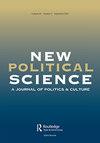The Democratic Difficulties of Oklahoma v. Castro-Huerta
IF 0.5
Q4 POLITICAL SCIENCE
引用次数: 0
Abstract
Abstract The Supreme Court, some commentators argue, is at its most undemocratic since the Lochner Era in the 1930s. They point to the Supreme Court’s majority opinion in Dobbs v. Jackson Women’s Health Organization, which departs from public opinion on abortion and longstanding constitutional precedence. Dobbs, however, is not an outlier. The Supreme Court made a similar move in Oklahoma v. Castro-Huerta. The majority opinion questioned almost 200 years of constitutional interpretation and several decades of congressional policy to enable state governments to exercise criminal authority over non-Indians in Indian Country. This article compares the majority opinion in Castro-Huerta to congressional policy to explore the democratic and constitutional difficulties that can arise when the Supreme Court refuses to defer to Congress—the democratically elected and constitutionally appointed institution for making federal Indian policy. It reveals how the Court’s undemocratic turn extends beyond cases involving individual rights.俄克拉荷马州诉卡斯特罗-韦尔塔案的民主党困境
摘要一些评论家认为,最高法院是自20世纪30年代洛奇纳时代以来最不民主的法院。他们指出,最高法院在多布斯诉杰克逊妇女健康组织案中的多数意见偏离了公众对堕胎和长期宪法优先权的看法。然而,多布斯并不是一个异类。最高法院在俄克拉荷马州诉卡斯特罗·韦尔塔案中也采取了类似的行动。多数意见对近200人提出质疑 多年的宪法解释和几十年的国会政策,使邦政府能够对印度国家的非印度人行使刑事权力。本文将Castro Huerta的多数意见与国会政策进行了比较,以探讨当最高法院拒绝服从国会时可能出现的民主和宪法困难。国会是制定印度联邦政策的民主选举和宪法任命的机构。它揭示了最高法院的不民主转向如何超越涉及个人权利的案件。
本文章由计算机程序翻译,如有差异,请以英文原文为准。
求助全文
约1分钟内获得全文
求助全文

 求助内容:
求助内容: 应助结果提醒方式:
应助结果提醒方式:


